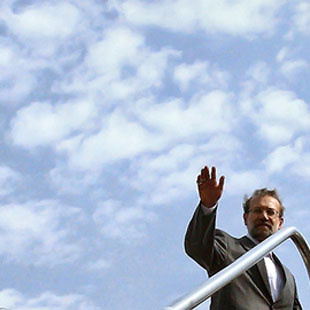Larijani’s Visit to Baku: a Step Forward

 Since Friday, Speaker of the Iranian Parliament Ali Larijani is on a three-day visit to the Republic of Azerbaijan. Relations between Tehran and its northern neighbor have been on-and-off since the independence of the Republic of Azerbaijan from the Soviet Union in the early 1990s. Baku’s close relations with the US and Israel, Tehran’s proposed model of Islamic rule, and differences over the fair share of the resource-rich Caspian Sea have been bones of contention between the two countries. Will Larijani’s visit signal a new chapter in Tehran-Baku relations? Iranian Diplomacy interviewed Hassan Beheshtipour, Caucasian affairs expert, about the prospect of Iran-Azerbaijan ties:
Since Friday, Speaker of the Iranian Parliament Ali Larijani is on a three-day visit to the Republic of Azerbaijan. Relations between Tehran and its northern neighbor have been on-and-off since the independence of the Republic of Azerbaijan from the Soviet Union in the early 1990s. Baku’s close relations with the US and Israel, Tehran’s proposed model of Islamic rule, and differences over the fair share of the resource-rich Caspian Sea have been bones of contention between the two countries. Will Larijani’s visit signal a new chapter in Tehran-Baku relations? Iranian Diplomacy interviewed Hassan Beheshtipour, Caucasian affairs expert, about the prospect of Iran-Azerbaijan ties:
IRD: Ali Larijani made a visit to Baku while the President of Azerbaijan Ilham Aliyev had rejected Iran’s invitation. Isn’t there ambiguity in Larijani’s visit?
HB: Larijani’s visit was in response to the trip by his Azerbaijani counterpart, which took place last year. His visit was in line with mutual interests. Iran-Azerbaijan relations have notably expanded during recent years, and both sides have changed their attitude towards their immediate neighbor. Ahmadinejad’s diplomatic strategy of improving ties with Baku, Tbilisi and Yerevan is quite visible. However, despite the wisdom behind this move, there is much more to gain. Several factors influence Tehran-Baku ties. Azerbaijan’s relations with Iran are closely tracked by Washington. Israelis are also quite active in the Republic of Azerbaijan, and have tried to expand their influence in Iran’s northern neighbor-- a development that Iran frowns upon.
IRD: How do you see the role of Azerbaijan’s media?
HB: They seem quite active in producing anti-Iran content. This may be because of the fervor among Azerbaijani citizens to follow Iran’s developments. The media are aware of the deep historical and cultural connections between the two sides of the Aras River and try to sustain the gap between citizens of the two countries. They fail to notice that cooperation between Tehran and Baku is mutually beneficial.
IRD: Could Iranian pan-Turks living in Azerbaijan influence bilateral ties?
HB: This is an important issue. For me, they are political bankrupts trying to undermine relations. Unfortunately, Baku has not clarified whether it wants to have close ties with the Iranian community, regardless of the ethnicities –Persian, Azeri, Kurd etc.- or whether it is only interested in Iranian Azeris. The sensitive term “Southern Azerbaijan” is also frequently used by the Republic’s media, reflecting their vain hope to unite the Republic of Azerbaijan and Iran’s Azeri-dominated regions.
The point is, if there is going to be any reunification, it is the Republic of Azerbaijan that should return to the heartland (1). Acknowledging national and ethnic identity is one thing, and ethnic supremacy is something else. Such ideas will create rifts among nations and serve those who want to see the region unstable.
IRD: Why did Ilham Aliyev reject Iran’s invitation?
HB: He has made frequent visits to Iran, so rejecting a diplomatic invitation is not a sign of tense relations –of course its reception would signal close ties. But the media in the Republic of Azerbaijan are making a mountain out of molehill since they don’t favor a thaw in relations.
IRD: Can the close relations between Israel and Azerbaijan influence Tehran’s relations with Baku?
HB: Iran is rightfully sensitive about the expansion of ties between Israel and Azerbaijan, but Azerbaijan is a sovereign state and it has the right to choose its friends. Iran is concerned with Baku hosting an Israeli military base, which eventually threatens Iran’s security.
(1) A significant portion of Iranian territory, including the present day Azerbaijan and parts of Georgia and Armenia, were separated by Russia during two wars in the early 1800s.

